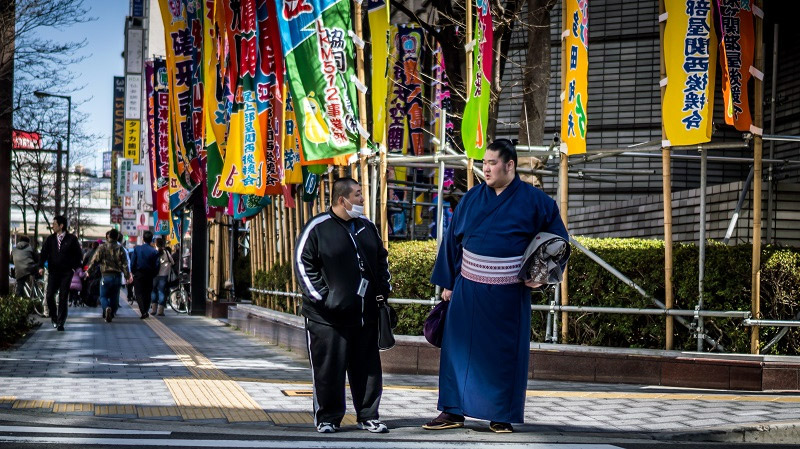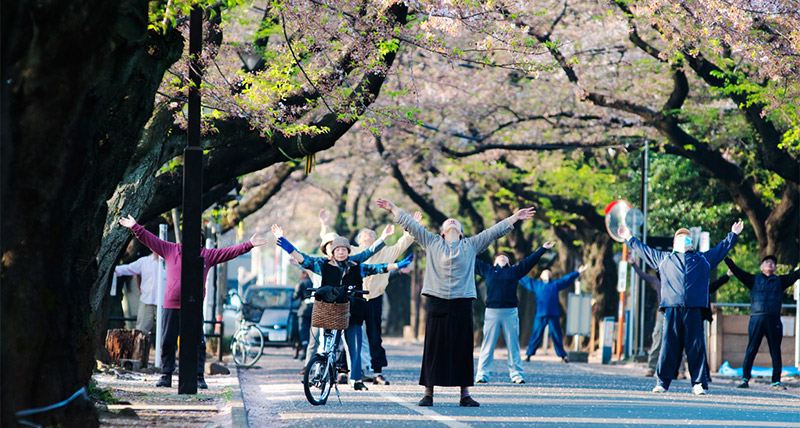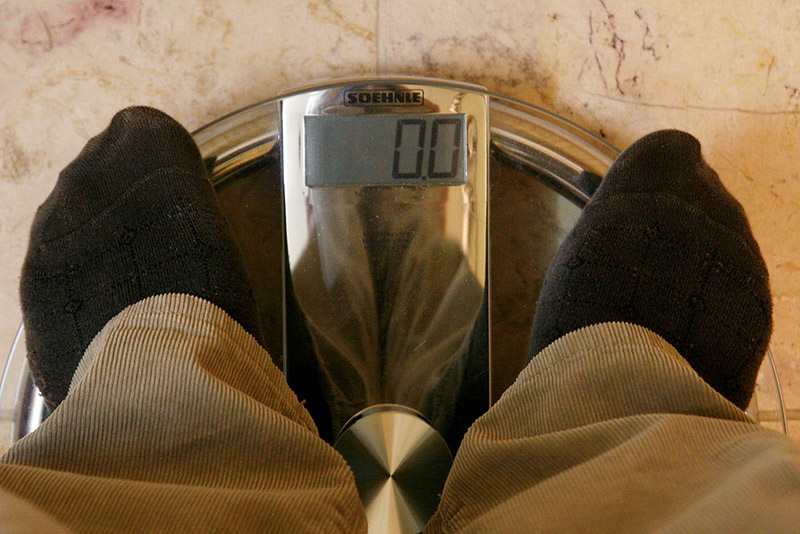Note from the author: This is about my personal experience and opinions. I am not a licensed nutritionist. The following entry is solely based on personal research, experience, and opinions and should be read as such. Those looking to lose weight should consult with a licensed physician to help them with a weight loss plan right for them.
I arrived in Japan weighing 300 pounds. I'd been 290-something before in 9th grade, but got down to 196 before muscle mass started to replace fat. I won't go into the details, but I suddenly started to regain my weight during graduate school. The people around me grew concerned, and rightly so, but I was about to embark on my fourth trip to Japan. Every other time I had visited for about three weeks, I dropped a pants size. I knew living in Japan helped make me healthy, but living here for an extended period of time really opened my eyes, not only to weight loss, but how Japanese people view fat people.
Being Fat in Japan

Before I get into the bad, let's start with some good. It's not all bad, but you might want to be careful. For example, one of my last meals with my brother in America was to our favorite Japanese buffet. When paying for the bill, I overheard the woman at the counter (who was quite attractive) was from Kyoto. When I paid for my bill, I gave her a quick "Ookini," which is Kyoto's dialectal "thank you." We chatted for a bit, I used a bit of the Kansai dialect I picked up (my Japanese isn't great, but I picked up some good words), and ended up getting her number. Actually, let me be honest: after mentioning I had a girlfriend, she said I should have a Japanese girlfriend before she gave me her number. This was at 300 pounds. Now, I'm sure the girl was after something else (maybe she was super lonely), but it happened.
After arriving in Japan, nearly every time I was introduced to an unmarried woman between 26 and 35, something different kept happening. Very different. It wasn't until I noticed that older people with unmarried daughters kept trying to throw their daughters at me, that I realized there was a reason for this: being foreign and knowing a little Japanese, even if you're fat and not-so-attractive, can still help you to attract girls who are looking for marriage. My supervisor started to add "he has a girlfriend" to my introduction whenever I met a new person, and it certainly changed the tone of things.
Your students might make fun of you a bit, but the girls in particular will be a bit less shy with you and open up (more on that later). You'll be more like a big brother in some ways, and they'll be really supportive of your weight issue. They may even be more polite about it than your co-workers because they may be going through the same issues.
Now, that being said, it's not all swimming in ladies and earning kids' trust. Fat people are generally seen as completely unattractive. I've had students call girls who, by American standards, are very much at a normal weight, "fat," so much so that one girl transferred schools. Both boys and girls can still be popular, but as one of my chubby female students privately mentioned, boys will mostly look at them as friends only. Hearing this from a sixteen year old girl who looks average can be pretty shocking.
It doesn't end with the way people see you. It's how they may treat you. I stayed with one family whose daughter had shown interest in me. They asked me how much I weighed, which was something I had never had been asked in all my other visits to Japan. The mother and father never let me forget I was fat, but they kept pushing me to eat more food. My weight, at the time, was less about how much I was eating and more about how little I exercised. Even when I losing weight, people pushed me to eat more. There was little respect for my diet, and I had to (sometimes not too politely) push back.
If you're fat in Japan, expect people to touch your belly. A lot. Even when you're thin it happens, so don't feel too bad. I'm still not sure why touching someone's stomach seems to be okay, especially since Japanese people are usually low-touch with strangers. However, "friendly" Japanese people will touch your stomach, fat or thin. Don't take offense, but you can still express that it feels strange.
Now, be careful in stores and trains. You might encounter some rudeness, Especially with strangers. Japan is not a large country. Just going into clothing stores will bring stares. I was looking for a shirt for my younger brother and, when I asked for a shirt in a large (all the ones on display were medium), I was told they didn't have my size and they suggested I try shopping at specialty store. This was in Tokyo. I never even tried in a rural area, but I'm sure it would have been worse. Taking up a lot of room in stores will get you dirty looks from strangers, especially if your butt knocks something off a rack. If someone breaks wind, even if it's a "Japanese smell," people will blame you (sometimes even in English, just by saying things like, "Very stinky" without directly looking at you). On a full train, if you're sitting, you may have pairs of very thin teenagers stare at you or even stand where you're sitting, waiting for you to get up. I offered my seat once to an older woman, and she also invited a teenage girl to sit next to her while I was standing right in front of her. It wasn't a great feeling.
If/when you start losing weight though, people will encourage you greatly. Even if you don't see it, people will notice, say they are jealous, ask for your secret, and in general, try to make you feel good. This might all sound odd by a country that gave birth to sumo, but be aware that even sumo will be used as a joke against you.
Losing the Weight

OK, so you're fat when you arrive. It's no big deal losing the weight though, as long as you do a few things that, well, are just a million times easier in Japan.
First is portion control and caloric intake. You could live off Pocky and karaage alone and lose weight if the calories are under, say 1500 a day. But you won't exactly be healthy. Now, keep in mind that I've worked off the weight before. I kept my diet at about 1500 calories a day, did my best to avoid meat (especially beef), ate granola and yogurt with toast and jam for breakfast, onigiri for lunch, some noodles with fishcakes and vegetables for dinner, and a piece of fruit and toast for a snack later. If I was really hungry, I had a fried egg with kimchi on toast. Japanese portions are less than in America, but the prices generally are the same. So even if you eat out, you'll probably be eating less. It should go without saying though, that you should avoid buffets. It's actually not that hard, especially since many are timed and being fat at a buffet will immediately get you stares, but it's worth saying, just in case.
A quick note on Japanese food though: it's not super healthy. Raw fat is used to grease your pan at many yakiniku places, Japanese beef is delicious because it has more marbled fat, popular fish tends to be fatty, butter and mayo is in just about anything that's delicious (sometimes both), and I've seen vegetarian salads with bacon in them. So you still need to make smart choices. Buy onigiri for lunch and make sure it isn't something with mayo.
Getting on my soapbox for a moment here, I'd say cut out sodas and fake juices as well. I've read enough studies about rats and corn syrup, plus I had drastically cut it out of my diet back in high school and lost a lot of weight. That may be one of the reasons I was able to lose the weight very quickly while a co-worker who claims to be doing a similar diet is still sipping Coke Zero and not looking any thinner to me.
Next is exercise in your everyday life. If possible (and I'd say most of the time it is), don't buy a car. If possible, don't get a bicycle either. Just walk. I know a bicycle makes things faster, but keep in mind that two things help lead to weight loss: the length of time you exercise and the effort put forth. A bicycle will cut down on your exercise time. Obviously you should still use the bus and subways for long distance travel but, for me, if a walk would take less than one hour one way, I'd do it. Even lots of short walks will help. The idea is you're staying active and moving, so even if you're not breaking a sweat (and good luck with that in the summer!), you are burning calories. As for your "limited time," let's be honest: a lot of foreigners spend a great deal of time alone at home waiting for the weekend. If you're actually learning Japanese, your walk home is actually a great time to review because you can't cheat and look in a book. Doing the exercises and going over grammar off the top of your head will show you how much you've really learned (or how little), plus give you a lot of exposure to real kanji and native speakers you might miss when flying by on a bike. I'd also highly suggest always taking the stairs. Always. If possible, take two steps at a time. It's great for the glutes!
One thing to note though: don't use walking as an excuse to eat more. This is how you're losing your weight! Keep to your diet and calorie counting. At first, you're going to be tired. You might get some headaches or feel grumpy. That's normal. You may want to check your diet plan with your doctor, but even with a doctor's help I had this problem. Just sleep more and understand it's a normal part of the process, even if you've done it before. However, if you feel light-headed, drink something and maybe eat some fruit. The last thing you want to do is faint! I have students fainting all the time and, while I'm told there are other problems, more than one teacher has told me that these student skip meals so they can lose weight. Don't do this.
Last, but not least, is a real exercise routine. This is really embarrassing, but when I first got to Japan this time, I was unable to do pushups, not because of a lack of upper body strength, but because I'd get sweaty and slip on the floor. I tried using a towel, but I ripped two in the process (they were cheap, so that might have been the cause or just a lucky break for my wallet). However, while walking alone will help, you want to get muscle too, right? Just keep it simple. For me, I sleep on a firm bed so, as soon as I wake up, I do crunches until I simply can't do them any more. Then I do the same for squats (you can use a western door frame to help you keep your balance) and finally for push-ups.
Japan does have gyms, but they can be quite inconvenient. I don't think any are open 24 hours, and Japanese work hours can be quite late and unpredictable. I know some yoga classes will actually lock you out if you're even one minute late. For this reason, I bought an adjustable dumbbell and some weights for it. I won't be able to get as strong as I did in high school and college since there's no room for a lot of gym equipment in my tiny apartment, but people have noticed that I'm getting bigger, but in a good way now.
After the Weight is Gone

So you've lost the weight. Great! Now you can hit the buffet. Don't over do it, but once in awhile is okay. You want to balance your diet, and you'll actually need to eat more if you're weight lifting. Keep in mind that you're going to be feeling the price of those extra calories with your wallet. Fresh fruits and vegetables can be more expensive in Japan, but I've found some buffets that let me eat all the broccoli, oranges, and even boiled eggs I want (oh, and curry). It's a great way to treat yourself but still stay healthy.
With your new shape will be a new image. It's not all good though. The sweet but sometimes desperate girls I got when I was fat were replaced by hardcore gaijin hunters- girls who seek you out simply so they can say they're dating a foreigner. I had an employee at a super market suggest we take a trip to Korea moments after I met her. If you thought the first girl I mentioned was aggressive, this girl certainly had her beat (among the PG offers I'm willing to share with the internet). If you're into that kind of woman, that's fine, but for me, it's a dirty feeling and has personally made my dating life very difficult compared to before.
For teachers, the kind of students who opened up to you before may become very shy, and the more flirty students will flirt with you (note: never be alone with students, and if you are, keep a door or window open and mention any flirting to your supervisor so there is a history of you disapproving of that behavior just in case a student tries something). You can kind of fix this if you have a picture of your fat self on you to show them how you've changed, which can win back the shy students and sometimes make the flirty ones a bit less flirty. You'll be more approachable to some students, but the ones you can probably help the most (and need it) will be a bit more difficult to reach because you seem more "normal" by Japanese standards.
Again, people will touch your belly if you're fat or thin, but people who've seen the change first hand will do it more often. I even had people reach into my suit jacket and wave their arm between that and where my stomach was now. As a note, they weren't always drunk when they did this. Speaking of clothes, you may still have some issues when going into stores if you're tall, but people are much more polite with people who are only tall rather than those who may be tall and overweight.
Those who knew you when you were fat, in general, will tell everyone your story. No, really. Everyone. I went to a new school and a teacher there had heard my story from another teacher. During my self introduction to a class, the teacher told all the students how much I used to weigh and how much I lost. They'll ask for your secret, ask your current weight, and oddly enough, the older generation may honestly be worried about you. Apparently, weight loss is seen as a sign of stress, and I've been told on more than one occasion that it's better to be fat when you're young so that you can lose it later when you're old and stressed.
People at home, though, will be pretty shocked. A lot will be concerned at first since, to them, the weight loss seems sudden. Once they see you're healthy and you can explain how you lost the weight, though, they'll be happy. For me, a lot of people had forgotten they knew me when I was thin, so that was a bit frustrating. But for those who didn't, it was a great feeling, and I felt that some of them actually became a bit more friendly with the new(er) me.
Going out in public, aside from being foreign, you'll be ignored more (unless you break wind, but if there's an overweight person nearby, they may get blamed instead of you). Knocking something over with your butt is no big deal and will only get a polite smile if you call attention to it. While I feel like I was always able to make myself approachable, I don't need to put forth quite as much effort now. Even when I'm having a bad day, people are willing to walk up and chat with me if they're the sort who like foreigners.
Being thinner in Japan certainly makes you a bit more normal, but makes your status as a foreigner stand out even more, in my opinion. Being fat, if anything, helped keep my foreign-ness at bay, but the treatment I got was certainly worse than what I faced at home in America. Losing the weight while in Japan certainly felt easier. Smaller portions and great public transportation make everyday life in Japan a lot healthier than what I feel is normal in the states. You won't suddenly lose the weight if you try to recreate your lifestyle at home, but assimilating just a bit will help you trim that waist line. Just be ready to do some clothes shopping next time you go back to your hometown!
